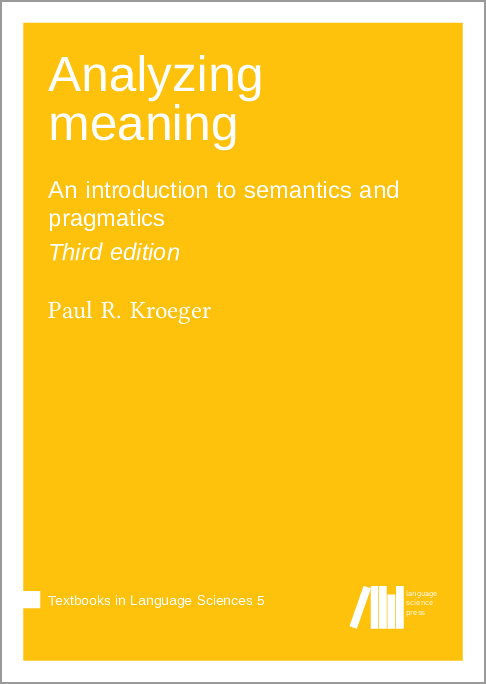In der letzten Zeit sind u.a. diese frei verfügbaren Titel erschienen:
Analyzing meaning: An introduction to semantics and pragmatics (3. Auflage)
Paul Kroeger
https://langsci-press.org/catalog/book/359 & https://doi.org/10.5281/zenodo.6855854
This book provides an introduction to the study of meaning in human language, from a linguistic perspective. It covers a fairly broad range of topics, including lexical semantics, compositional semantics, and pragmatics. The chapters are organized into six units: (1) Foundational concepts; (2) Word meanings; (3) Implicature (including indirect speech acts); (4) Compositional semantics; (5) Modals, conditionals, and causation; (6) Tense & aspect.
Most of the chapters include exercises which can be used for class discussion and/or homework assignments, and each chapter contains references for additional reading on the topics covered.
As the title indicates, this book is truly an introduction: it provides a solid foundation which will prepare students to take more advanced and specialized courses in semantics and/or pragmatics. It is also intended as a reference for fieldworkers doing primary research on under-documented languages, to help them write grammatical descriptions that deal carefully and clearly with semantic issues. The approach adopted here is largely descriptive and non-formal (or, in some places, semi-formal), although some basic logical notation is introduced. The book is written at level which should be appropriate for advanced undergraduate or beginning graduate students. It presupposes some previous coursework in linguistics, but does not presuppose any background in formal logic or set theory.
Conspiracy Theory Discourses
Massimiliano Demata, Virginia Zorzi & Angela Zottola (Hrsg.)
https://doi.org/10.1075/dapsac.98
Conspiracy Theory Discourses addresses a crucial phenomenon in the current political and communicative context: conspiracy theories. The social impact of conspiracy theories is wide-ranging and their influence on the political life of many nations is increasing. Conspiracy Theory Discourses bridges an important gap by bringing discourse-based insights to existing knowledge about conspiracy theories, which has so far developed in research areas other than Linguistics and Discourse Studies. The chapters in this volume call attention to conspiracist discourses as deeply ingrained ways to interpret reality and construct social identities. They are based on multiple, partly overlapping analytical frameworks, including Critical Discourse Analysis, rhetoric, metaphor studies, multimodality, and corpus-based, quali-quantitative approaches. These approaches are an entry point to further explore the environments which enable the proliferation of conspiracy theories, and the paramount role of discourse in furthering conspiracist interpretations of reality.
Syntax of Hungarian: coordination and ellipsis
Zoltán Bánréti
https://doi.org/10.1515/9789048556038
Syntax of Hungarian aims to present a synthesis of the currently available syntactic knowledge of the Hungarian language, rooted in theory but providing highly detailed descriptions, and intended to be of use to researchers, as well as advanced students of language and linguistics. As research in language leads to extensive changes in our understanding and representations of grammar, the Comprehensive Grammar Resources series intends to present the most current understanding of grammar and syntax as completely as possible in a way that will both speak to modern linguists and serve as a resource for the non-specialist.
This volume provides a comprehensive overview and description of coordinate structures, the syntactic and semantic types of conjunctions, as well as the types of ellipses in sentences and short dialogues. It discusses multiple conjunctions, coordinated wh-constructions, sluicing, and sentence fragments.
Reihe „Empirische Linguistik“ bei De Gruyter
Diese Schriftenreihe wurde auf open access umgestellt.
Die Reihe trägt der Tatsache Rechnung, dass sich die empirische, auf qualitative oder quantitative Korpusanalyse gestützte Beschreibung von geschriebener und gesprochener Sprache mittlerweile als zentrales Paradigma innerhalb der Sprachwissenschaft etabliert hat. Eine gebrauchsbasierte Orientierung ist dabei auf allen Ebenen der Sprachbeschreibung zu beobachten, sie reicht von Ansätzen in der Phonologie- bzw. Prosodieforschung über empirische Arbeiten in der Morphologie, Syntax und Semantik bis hin zu pragmatischen Ansätzen wie beispielsweise der Diskurs‑, Text- und Gesprächsanalyse sowie der Medien- und Soziolinguistik. Das Ziel der Reihe ist, eine thematisch offene Plattform für unterschiedliche Ansätze innerhalb der synchron orientierten Sprachwissenschaft sowie für interdisziplinäre Arbeiten mit einem sprachwissenschaftlichen Schwerpunkt bereitzustellen, die innovative Wege empirischen Arbeitens aufzeigen und neue Methoden und theoretische Modelle anhand von Datenmaterial entwickeln.
Publiziert werden Monographien sowie Sammelbände mit einem synchronen, datenbasierten Zugang zu Sprachanalysen. Die Publikationssprache ist entweder deutsch oder englisch. Alle Beiträge werden peer-reviewed.Open Access: Dank eines Pilotprojekts mit dem FID Linguistik werden zwischen 2019 und 2021 sechs Neuerscheinungen Open Access publiziert. Zudem wurden die bereits erschienenen E‑Books der Bände 1 bis 9 nachträglich in Open Access-Publikationen umgewandelt.


